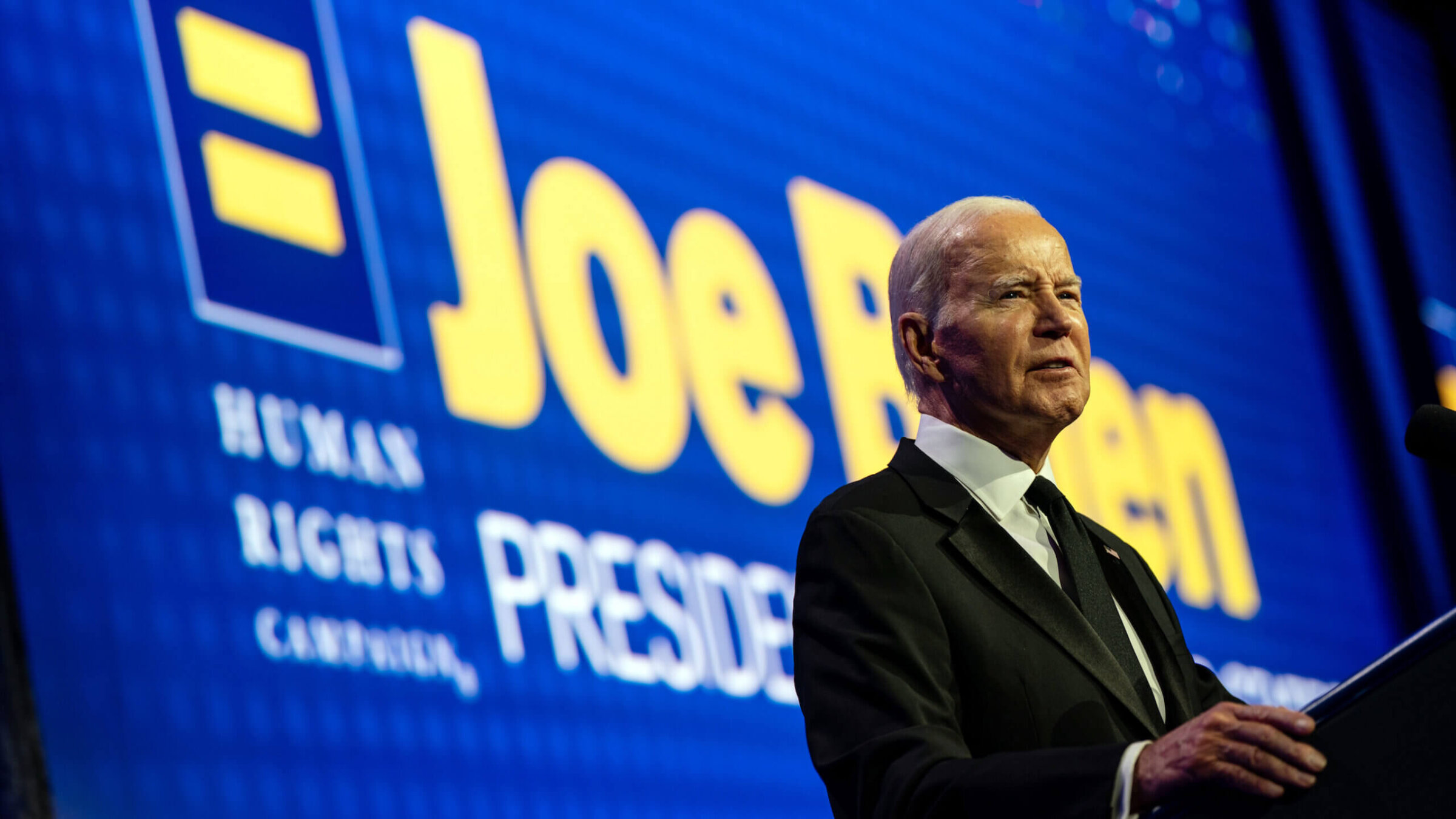Can Biden transform a human tragedy into a diplomatic opportunity?
In times of catastrophe, there is a window for progress

President Joe Biden speaks during the 2023 Human Rights Campaign National Dinner at the Washington Convention Center on Oct., 14, 2023. Photo by Kent Nishimura/Getty Images
President Joe Biden has declared many times that he is a Zionist, and his full-throated support for Israel following the brutal terrorist attack by Hamas has touched every soul in that country. He now faces a historic opportunity to save Israel from a bloody binational inevitability in which it would no longer be the democratic state of the Jewish people according to the Zionist vision.
Babies, children, and entire families were slaughtered. No eye can stay dry at the sight of the pictures of the kidnapped children. The state of Israel went through the hardest day in its history, a day that will take us a long time to overcome.
The crimes against humanity committed by Hamas are the most horrible tragedy that the Israeli-Palestinian conflict has produced. But even in times of catastrophe, there is a window for progress.
This was one lesson from the 1973 Yom Kippur War, where the national trauma eventually led to a peace agreement between Israel and Egypt. It was also the First Intifada, or Palestinian uprising, that led to the Oslo Peace Accords. War and bloodshed are often the greatest motivation for compromise.
Now it is time to understand that the Palestinian conflict — including the reign of terror of Hamas in the Gaza Strip — will not be solved by war only. As the U.S. learned in Iraq, Afghanistan and Vietnam, even the strongest military in the world cannot solve such challenges with guns and bombs alone.
The opportunity for President Biden to lead a major change of course in the Middle East arises as well after a year-long protest movement inside Israel to protect and preserve our democracy. The general failure of Prime Minister Benjamin Netanyahu and his government to function during the Hamas attack and its aftermath opens a door to connect the protest movement with the no-less-significant threat to Israel’s democracy posed by its ongoing occupation of the West Bank.
The Biden administration can and should push the Palestinian issue to the forefront of the Israeli public agenda and instill hope among moderate Palestinians that they can achieve statehood by diplomacy and not terror, to lead the Israeli government to a policy based on the understanding that strengthening the Palestinian Authority as a governing body is an Israeli and international interest.
This moment also comes amid aspiration for a U.S.-Saudi Arabia defense alliance and the normalization of Israel-Saudi relations. While these are hardly close to creating a two-state solution, they could provide leverage for Washington on both Israel and the region — leverage that at its core is the promotion of the belief that the fruits of normalization will be shared by everyone in the region, including the Palestinians.
The first response of the Biden Administration following the Hamas attack rightly focused on military support for Israel. Now, the U.S. can act diplomatically by initiating an international effort for a long-term solution. It should mobilize the United Nations Security Council to recognize a Palestinian state based on the 2002 Saudi Arab Peace Initiative for a two-state solution, and demand Palestinian elections that will provide one legitimate leadership representing both Gaza and the West Bank for negotiations.
Except for the governments of Israel, Iran, and Hamas in Gaza, there is an overwhelming international consensus for the establishment of a Palestinian state, and Palestine can easily be accepted as a full member of the U.N. if the U.S. does not use its Security Council veto.
This is good for Washington as well as the Middle East. Given the impact of rising oil prices on the global economy, the U.S. wants to mobilize countries in the region that export energy to exert pressure against Russia. Biden has an opportunity here to promote global interests and to arrive at an agreement with China and Russia on a two-state solution.
American leadership is the best way to prevent Russia and China from taking advantage of the vacuum created by Washington’s justified withdrawal from the “boots on the ground” approach of the Bush Administration.
Despite Biden’s clear and principled support for a two-state solution, he has in his first three years as president largely avoided the issue. Now that a catastrophe has occurred so tragically, it is time to take strategic action. And it could help him win reelection next year.
The Democratic Party is riper than ever to support a move on the Palestinian issue. For many years, the party was influenced by American Jews who supported the status quo of Israel’s occupation. Now a new generation of Democratic lawmakers have come to realize that there are no military solutions to the conflict. No less significant is the growth of organizations like mine, J Street, that support Israel, democracy and peace, and believe in the power of courageous diplomacy to promote both Israeli and U.S. interests.
President Biden has a unique opportunity to be remembered in history as the one who saved the Zionist vision of liberty, justice and peace, along with Israel’s fragile democracy. He would be building on the legacies of giants before him — President Harry S. Truman, who recognized the state of Israel; President Jimmy Carter, who led Israel to peace with Egypt; and President Bill Clinton, who signed the Oslo Peace Accords.
Biden described the Hamas terrorist attack in Israel as an act of sheer evil and an atrocity on an appalling scale. His empathy for our anger, pain and hopelessness has, more than ever before, earned him the trust of Israelis. He can now leverage this trust with a move that would save Israel from the biggest threat to its mission as the democratic homeland of the Jewish people — which is the continuing occupation.



















